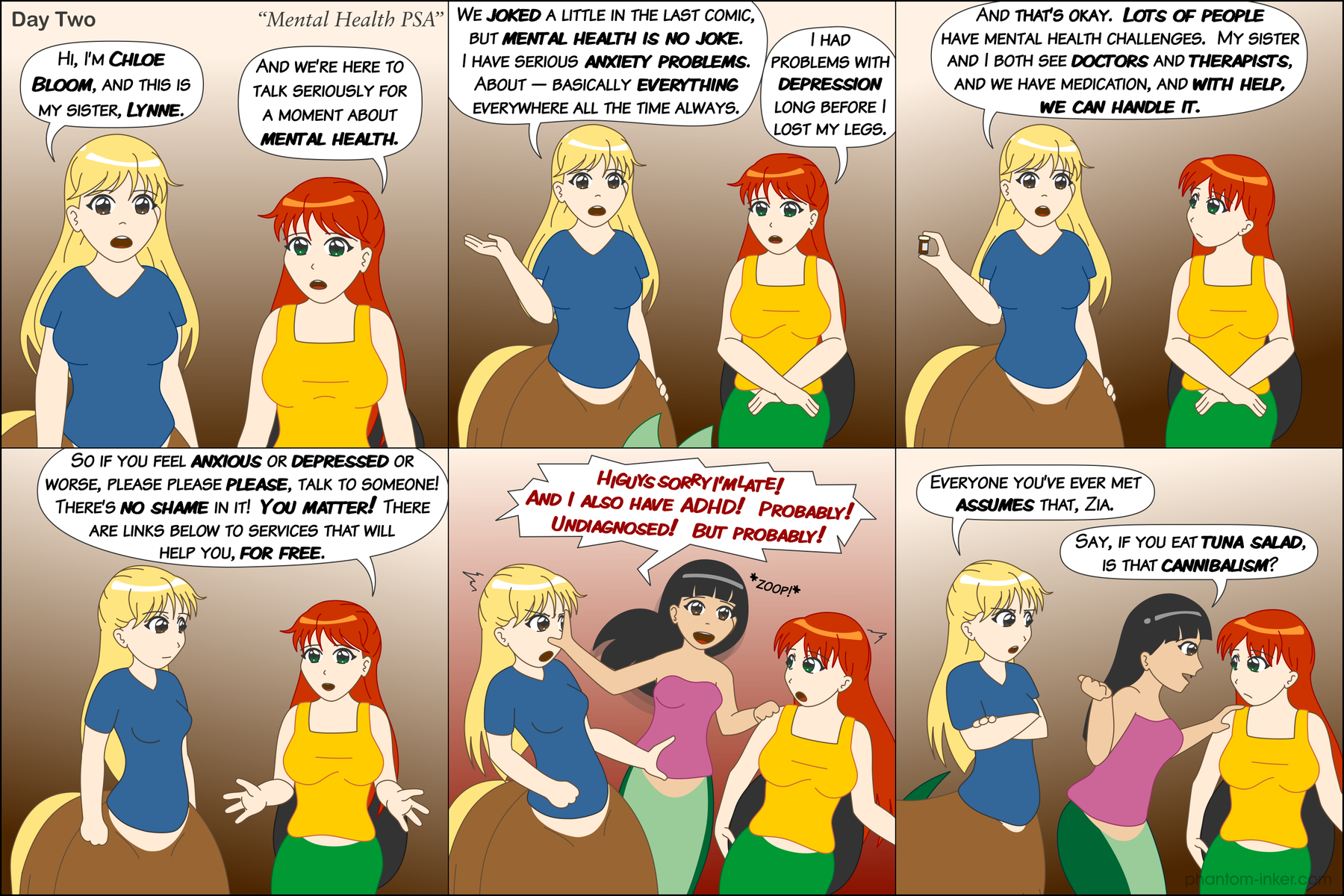Mental Health PSA Public Service Announcements

⏮︎ First ⏪︎ Ch. Start ⏴ Prev Next ⏵ Next Ch. ⏩︎ Latest ⏭︎
- Chloe: "Hi, I'm Chloe Bloom, and this is my sister Lynne." Lynne: "And we're here to talk seriously for a moment about mental health."
- Chloe: "We joked a little in the last comic about it, but mental health is no joke. I really do have serious anxiety problems. About — basically everything everywhere all the time always." Lynne: "I had problems with depression long before I lost my legs."
- Chloe (holds up medication): "And that's okay. Lots of people have mental health challenges. My sister and I both see doctors and therapists, and we have medication, and with help, we can handle it."
- Lynne: "So if you feel anxious or depressed or worse, please please please, talk to someone! There's no shame in it! You matter! There are links below to services that will help you, for free."
- Zia pops up, her hand on Chloe's face. *zoop*. Zia: "HiGuysSorryI'mLate! And I also have ADHD! Probably! Undiagnosed! But probably!"
- Chloe (irritably): "Everyone you've ever met assumes that, Zia." Zia (to Lynne): "Say, if you eat tuna salad, is that cannibalism?"
No matter who you are, no matter how bad it is, the world is still better with you, the real you, in it. If you're anxious, depressed, scared, distraught, or worse, you need to talk to someone about what you're feeling. There are people who want to and who can and who will help you. You matter. 
You can call, or text, or e-mail, or even chat via Facebook or WhatsApp. People on the other end will care, and they will listen, and they will do everything they can to help you. You don't have to go it alone. You're not in it alone. You're not in anything alone.
-
988 - There's a new 988 mental-health hotline in North America. Mental-health experts are available around the clock, ready to help you with whatever you need. Seriously, anything: Depression, anxiety, suicide, eating disorders, natural disasters, domestic abuse, sexual assault, LGBTQ+ issues, loss of a loved one — old, young, or anywhere in between, you *can* get help. (You can also call 800-273-TALK (8255), and you can even chat online at 988lifeline.org.)
-
Crisis Text Line - You don't have to talk: You can just text, if talking is too hard or too scary, and someone who cares will text you back and will try to help you. You can access this from your phone, or from WhatsApp too. You can go to crisistextline.org, or you can text HOME to 741741 from anywhere in the United States or Canada. And this is a nonprofit, supported only by donors — no government agency is involved, and on major phone carriers, these messages will never appear on your phone bill.
-
National Domestic Violence Hotline, and National Sexual Assault Hotline - Sometimes it's not just you. If you're afraid of someone you live with, or you're afraid for someone you live with, or you're afraid for someone in trouble, or you're afraid of something that happened, call 800-799-SAFE (7233) (domestic violence) or 800-656-HOPE (4673) and get help. They can and will help you.
-
Something else not mentioned? Gambler? Drug-addicted? Dealing with HIV? A veteran with flashbacks or PTSD? A college grad who's terrified you'll never get a job? APA has resources for these and lots of other issues. You don't have to deal with any of this alone.
All of these services are confidential. They won't report you. They won't arrest you. Your name won't be in the newspapers. No-one will know except you. They're there to help, not to hurt. And they can make it better.
Me personally? I'm a lot like Chloe: I worry about everything all the time always, and I'm terrible in social situations, and I second-guess and third-guess everything I do, even things I did decades ago. I've had panic attacks before — severe enough to put me in an ambulance and in a hospital. I've managed — with help — to channel my anxieties into things that make me successful, but I still worry all the time always that everything can and will go wrong, that the house of cards will suddenly come crashing down, that the dark whirlpool will finally swallow me no matter how hard I swim against it. I don't recommend the inside of my brain to anyone. And yes, I take doctor-prescribed meds for it, and they do help.
And I've had friends who committed suicide. And I've had friends who died young. And I can say without hesitation that there's no situation in which the world is better off without you in it. You're needed. You're important. And if you're in a bad place, you don't have to climb out of it on your own.
So this isn't just distant well-wishing where I sit. I know how it feels. I know the pain. I can write Chloe and Lynne because I know them way too well. If you need help, please, please, please talk to someone. Things can be fixed. It might not seem like it, but things can be better. All you have to do is be willing to believe that help really does exist out there — because it does.
(And if you're outside the United States, I don't know what mental-health services exist in your country, but they exist, and Google Search can find them for you.)
